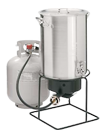
As you gather to celebrate Thanksgiving with your friends and family, DHS, FEMA and the U.S. Fire Administration (USFA) want to help keep you and your loved ones safe from fire hazards.
That's why USFA has teamed up with the National Fire Protection Association (NFPA) to 'Put a Freeze on Winter Fires'. They have compiled helpful videos, fact sheets, podcasts and more to keep you and your family safe this Thanksgiving.
As families gather in kitchens across the country to cook Thanksgiving dinner, many are stepping into what can be one of the most hazardous rooms in the house if you don't practice safe cooking habits.
According to data from the USFA, an estimated 2,000 Thanksgiving Day fires in residential buildings occur annually in the United States, resulting in an estimated average of five deaths, 25 injuries, and $21 million in property loss each year. The leading cause of all Thanksgiving Day fires in residential buildings is cooking. In addition, these fires occur most frequently in the afternoon hours from noon to 4 p.m. And unfortunately, smoke alarms were not present in 20 percent of Thanksgiving Day fires that occurred in occupied residential buildings.
USFA's 'Put a Freeze on Winter Fires' provides tons of safety tips for you and your family this Thanksgiving. Some of their safe cooking tips are:
- Make sure you have smoke alarms on every level of your home, outside each sleeping area, and in every bedroom. Test smoke alarms monthly and replace them if they are 10 years old or older.
- Keep a close watch on your cooking. You should never leave cooking food unattended.
- Keep oven food packaging and other combustibles away from burners and heat sources.
- Heat cooking oil slowly and watch it closely; it can ignite quickly.
- Don't wear loose sleeves while working over hot stove burners - they can melt, ignite or catch on handles of pots and pans spilling hot oil and other liquids.
- Have a "kid-free zone" of at least three-feet around the stove and areas where hot foods or drinks are prepared or carried.
- Keep a lid nearby to smother small grease fires. Smother the fire by sliding the lid over the pan and turn off the stovetop. Leave the pan covered until it is completely cool.

Of course, Thanksgiving just wouldn't be Thanksgiving without the turkey. And deep-fried turkey has become a favorite Thanksgiving tradition in many households. But if used improperly, an overloaded fryer can easily tip over and set an entire house ablaze. USFA offers the following helpful tips to backyard chefs who plan to deep-fry a turkey for Thanksgiving:
- Turkey fryers should always be used outdoors a safe distance from buildings and any other flammable materials.
- Never use turkey fryers in a garage or on a wooden deck.
- Make sure the fryers are used on a flat surface to reduce accidental tipping.
- Never leave the fryer unattended. Most units do not have thermostat controls. If you do not watch the fryer carefully, the oil will continue to heat until it catches fire.
- Never let children or pets near the fryer even if it is not in use. The oil inside the cooking pot can remain dangerously hot hours after use.
- To avoid oil spillover, do not overfill the fryer.
- Use well-insulated potholders or oven mitts when touching pot or lid handles. If possible, wear safety goggles to protect your eyes from oil splatter.
- Make sure the turkey is completely thawed and be careful with marinades. Oil and water do not mix, and water causes oil to spill over causing a fire or even an explosion hazard.
- The National Turkey Federation (NTF) recommends thawing the turkey in the refrigerator approximately 24 hours for every five pounds in weight.
- Keep an all-purpose fire extinguisher nearby. Never use water to extinguish a grease fire. If the fire is manageable, use your all-purpose fire extinguisher. If the fire increases, immediately call the fire department for help.
Thanks, and from all of us at DHS, have a happy and safe Thanksgiving.
